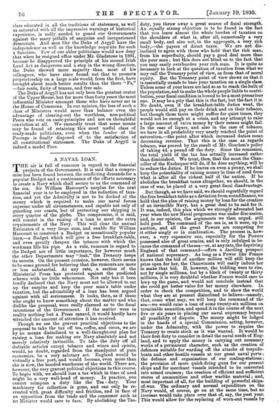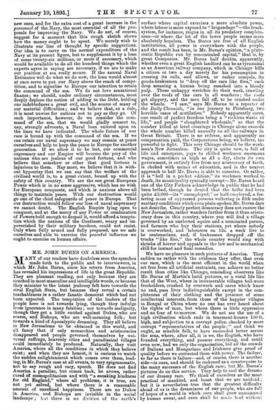A NAVAL LOAN. T HE air is full of rumours in
regard to the financial projects of the Government. It is said that a compro- mise has been found between the conflicting demands for a popular Budget and a continuance of the efforts necessary to create a Navy which shall secure to us the command of the sea. Sir William Harcourt's surplus for the next financial year is to be employed in the reduction of taxa- tion, and yet the Admiralty is not to be docked of the money which is required to make our naval forces supreme under all circumstances, and capable not only of guarding our coasts, but of protecting our shipping in every quarter of the globe. The compromise, it is said, will consist in the raising of a loan to meet the extra requirements of the Navy. This will clear the annual Estimates of a very large sum, and enable Sir William Harcourt to construct a Budget on sensationally popular lines,—a Budget which will give a free breakfast-table, and even greatly cheapen the tobacco with which the 'workman fills his pipe. As a rule, rumours in regard to the Budget are of little importance, for however much the other Departments may "leak," the Treasury keeps -its secrets. On the present occasion, however, there seems .to be some ground for believing that the rumours are more or less substantial. At any rate, a section of the Ministerial Press has protested against the predicted scheme with no little vehemence. Not only has it been loudly declared that the Navy must not be allowed to eat up the surplus and keep the poor man's table under taxation, but the advisability of a loan has been argued against with all seriousness. It looks, then, as if those who ought to know something about the matter and who -dislike the proposal, were really alarmed as to the fiscal intentions of the Government. If the matter were in reality nothing but a Press canard, it would hardly have lttracted the amount of attention it has received.
Though we see the gravest practical objections to the proposal to take the tax off tea, coffee, and cocoa, we are by no means disinclined to a well-thought-out plan for raising a loan for making our Navy absolutely and not merely relatively invincible. To take the duty off all dutiable articles except tobacco and wines and spirits, would, no doubt, regarded from the standpoint of pure economics, be a very salutary act. England would be virtually a free port, and would become, even more than she is now, the bonded warehouse of the world. There are, however, the very gravest political objections to this course. To begin with, we should lose a tax which in time of need might be a very well-head of money. In practice, you cannot reimpose a duty like the Tea - duty. Your machinery for collection is gone, and can only be re- created with great difficulty and friction, and in face of an opposition from the trade and the consumer such as no Minister would care to face. By abolishing the Tea- duty, you throw away a great source of fiscal strength. An equally strong objection is to be found in the fact that you leave almost the whole burden of taxation on the shoulders of what is, after all, numerically a very small body, and also not, in the aggregate, a very rich body,—the payers of direct taxes. We are not dis- inclined to agree with those who hold that the rich man, from his superfluity, should pay a good deal more than the poor man ; but this does not blind us to the fact that you may easily overburden your rich man. It is quite as necessary to look at the question of taxation from what we may call the Treasury point of view, as from that of moral equity. But the Treasury point of view shows us that it is essentially unsafe to base your taxation on a single class. Unless some of your taxes are laid so as to reach the bulk of the population, and to make the whole people liable to contri- bution, your fiscal condition is bound to be a most precarious one. It may be a pity that this is the fact, but the fact it is. No doubt, even if the breakfast-table duties went, the people would still pay on their drink and on their tobacco, but though these taxes might suffice for quiet times, they would not be enough at a crisis, and any attempt to raise a large amount of extra money by their means might fail. In the case of liquor, and also in the cake of tobacco, we have in all probability very nearly reached the point of saturation,—the point after which increased duties mean decreasing revenue. That this is the case as regards tobacco, was proved by the result of Mr. Goschen's policy of taking 4d. a pound off the duty. Since the remission, the total yield of the tax has actually increased rather than diminished. We trust, then, that the most the Chan- cellor of the Exchequer will do, if he does anything, will be to reduce the duties. If he leaves on even a penny, we shall keep the potentiality of raising money in time of need from what is after all the richest half of the nation. If he abolishes the breakfast taxes altogether, we should, in the case of war, be placed at a very great fiscal disadvantage.
But though, as we have said, we should regretfully regard the free breakfast-table as a deviation from sound finance, we hold that the plan of raising money by loan for the creation of an invincible Navy, has a great deal to be said for it. It was, indeed, this plan which we strongly advocated last year when the new Naval programme was under discussion, and, in our opinion, the arguments we then urged, still hold good. The command of the sea is, as it were, up to auction, and all the great Powers are competing for it either singly or in combination. The process is, how- ever, a very expensive one, especially for the Powers possessed also of great armies, and is only indulged in be- cause the command of the sea—or, at anyrate, the depriving England of that command—offers a dazzling prospect of national supremacy. As long as a Power like France knows that the bid of another million will still keep the prize open for her, the Chauvinists will easily induce her to make that bid. If, however, the bidding were to rise, not by single millions, but by a block of twenty or thirty millions, it is very doubtful whether France would care to keep up the game, and would not conclude instead that she could get better value for her money elsewhere. In order to check the competition, and to show the world what they are at present disinclined to believe—namely, that, come what may, we will keep the command of the sea—we would raise a loan of some twenty-six millions on terminable annuities, and spend it in the course of the next five or six years in placing our naval supremacy beyond all possibility of dispute. The money might be lodged in the hands of a special Commission, acting, however, under the Admiralty, with the power to require the Treasury to create stock as it was wanted. It would be their first duty to consider in detail the naval needs of Eng- land, and to apply the money in carrying out necessary works of a permanent character, such as the creation of defences suitable for warding off the attacks of torpedo- boats and other hostile vessels at our great naval ports ; the defence and organisation of our coaling-stations ; the provision of more quick-firing guns for our present ships and for merchant vessels intended to be converted into armed cruisers ; the creation of efficient and sufficient stores of ammunition and other warlike material ; and, most important of all, for the building of powerful ships- of-war. The ordinary and normal expenditure on the Navy would, of course, go on at the same time, but no increase would take place over that of, say, the past year. This would allow for the replacing of worn-out vessels by new ones, and for the extra cost of a great increase in the personnel of the Navy, the most essential of all the pro- posals for improving the Navy. We do not, of course, suggest for a moment that this rough sketch shows how the money ought to be spent. We merely wish to illustrate our line of thought by specific suggestions. Our idea is to carry on the normal expenditure of the Navy at its present figure, but to supplement it by a loan of some twenty-six millions, or more if necessary, which would be available to do all the hundred things which the experts agree in saying are necessary, if we are to make our position at sea really secure. If the annual Naval Estimates will do what we do now, the loan would almost at once serve to put our Navy above the reach of compe- tition, and to signalise to Europe our intention to retain the command of the sea. We do not love sensational finance ; we should, under ordinary circumstances, most deeply deplore the notion of adding to the Debt, holding our indebtedness a great evil, and the source of many of our material difficulties ; and we believe that, as a rule, it is most unwise for nations not to pay as they go. Of such importance, however, do we consider the com- mand of the sea, that we would gladly consent to, nay, strongly advocate, a Naval loan entered upon on the lines we have indicated. The whole future of our race is bound up with the command of the sea,. If we can retain our naval supremacy we may remain at peace ourselves and help to keep the peace in Europe for another generation. If we allow it to be lost, our commercial supremacy and our Empire will become the prey of the nations who are jealous of our good fortune, and who believe that somehow or other that good fortune is injurious to them. Nay more, we believe that it is with- out hypocrisy that we can say that the welfare of the civilised world is, to a great extent, bound up with the safety of this country. We are the one great European Power which is in no sense aggressive, which has no wish for European conquests, and which is anxious above all things to maintain peace. With our destruction would go one of the chief safeguards of peace in Europe. That our destruction would follow our loss of naval supremacy we cannot doubt. The English Empire lying open to conquest, and at the mercy of any Power or combination of Powers bold enough to despoil it, would afford a tempta- tion which the nations of the Continent, weary and im- poverished by their military burdens, could not resist. Only when fully armed and fully prepared, are we safe ourselves and able to exercise the peaceful influence we ought to exercise on human affairs.



































 Previous page
Previous page